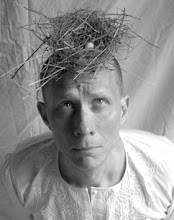On Saturday, as part of FotoWeek DC, I was at my photography home-base, Photoworks Glen Echo, taking part in a digital portfolio review session. Photographers, both fledglings and veterans, had the opportunity to show a selection of images that they brought in on discs or flash drives to be projected on the wall. I was invited to be one of the reviewers, a new experience for me. Here, in no particular order, are a few observations from that experience:
1. People really want the feedback experience. We had high participation in this event, much of it from folks who'd never been to Photoworks before. It seems that if you just hang out the shingle and say you are offering critique, folks will show up. Why? Some of it is a desire for guidance, since most of the photographers were asking for advice about organization or how to shoot better. But a lot of it, I believe, is the desire to connect, to get the artwork out of the realm of the personal and into some kind of forum where it is connecting. It is so interesting to note how keyed up, excited, nervous, just plain alive people are in the moment when a room puts its undivided attention on their work.
2. It is strange to be positioned as an authority. This was a situation where I was one of two, sometimes three, people in the room designated to offer comments. At times I felt much more qualified as a kind of articulate audience member than as a person especially knowledgeable about photography. In a way it was freeing to be set up as an authority, kind of like putting on a mask.
3. In some ways, it is much easier to be asked to comment as an authority figure than it is to take part in a feedback dialogue of multiple, equalized voices. It's easy to rattle off your reaction to something. What we ask responders to do in a CRP session actually requires a level of listening, thinking, processesing, weighing, choosing to speak or keep silent, that is highly demanding for those who really invest in it.
4. Questions are really powerful. I felt as a commentator that I had the most chance of being useful when the photographers brought not only their images but their questions to the table. And I had the most chance of getting through to something valuable for the artists when I was able to form a good question for them to think about. But we knew that, didn't we?
5. Editing is artistry. Photography is an artform that puts this principle in high relief. What you create is just the beginning. How you choose from what you create is where voice and meaning truly emerge.
Monday, November 24, 2008
Subscribe to:
Post Comments (Atom)


No comments:
Post a Comment